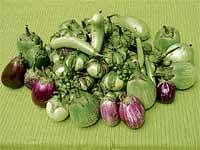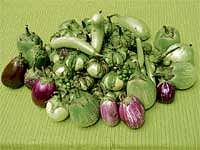

The Minister has announced that he will be taking a final call on whether to give a green signal for the commercial production of bacillus thuringiensis (Bt) brinjal in the country after the public hearing in Bangalore. But taking a final decision is not going to be an easy task as environment groups and in particular pro-organic farming community is firmly opposed to cultivation of the genetically modified variety.
The Genetic Engineering Approval Committee (GEAC) has allowed commercial cultivation of Bt brinjal. Chief Minister Yeddyurappa has said he will not allow cultivation of the genetically modified brinjal in the State on the grounds that its bio-safety has not yet been established.
University of Agricultural Sciences, Dharwad, with technology made available by Maharashtra Hybrid Seeds Company Ltd (Mahyco) has been doing research on transgenic brinjal from 2002 and has cultivated six varieties of pest-resistant brinjals. The university had conveyed the positive results of its research to the government. But the government has taken a contradictory view.
Fruit & shoot border (FSB)-resistant brinjal is cultivated by incorporating the Cry1Ac gene. When ingested by the FSB larve, the Bt protein is activated in the insect’s alkaline gut and binds to the gut wall, which breaks down and eventually leads to larval death.
On the eve of the crucial public consultation on Saturday, Deccan Herald is presenting the views of both the scientific community who are into genetic engineering research and environmentalists who have apprehensions regarding the technology.
Divergent views
Prakash M Salimath, Director of Research, UAS, Dharwad. He is heading a team of scientists which has developed pest-resistant brinjals:
* 30-50 chemical sprays are applied to control FSB, but Bt requires only 3 to 4
* No shoot infestation in Bt varieties cultivated by University
* Over 95 pc of Bt.brinjal found marketable compared to 30-45 pc non-Bt varieties
* Cry1Ac protein has no effect on human beings & non-target pests
Prof G K Veeresh, former VC of UAS, Bangalore. He is the president of the Association for Promoting Organic Farming.
* No farmer, consumer or government had expressed problem in managing brinjal crop.
* Bt technology is effectively only against the borer, while brinjal has many more pests.
* India has varieties of brinjal. Once Bt variety is introduced, the local varieties may be wiped out.
Vageeshbabu S Hanur & his team, Biotech division, Indian Institute of Horticultural Research, Bangalore. Th team have developed Bt brinjal variety arka keshav using Cry2A Bt gene and trials are in advanced stage:
* The advantage of arka keshav is that farmers need not buy seeds every time they sow
* No instances of natural inter-specific hybridization between cultivated and wild species of brinjal have been repoThe advantage of arka keshav is that farmers need not buy seeds every time they sow
* No instances of natural inter-specific hybridization between cultivated and wild species of brinjal have been repo
Dr Pushpa Bhargav, GEAC member
* In the West, reseach has established Bt can adversely affect health
* GM crops can modify DNA in humans and are known to cause 50 listed diseases
* Indian researchs on Bt is funded by the US, which intends to control Indian agriculture.